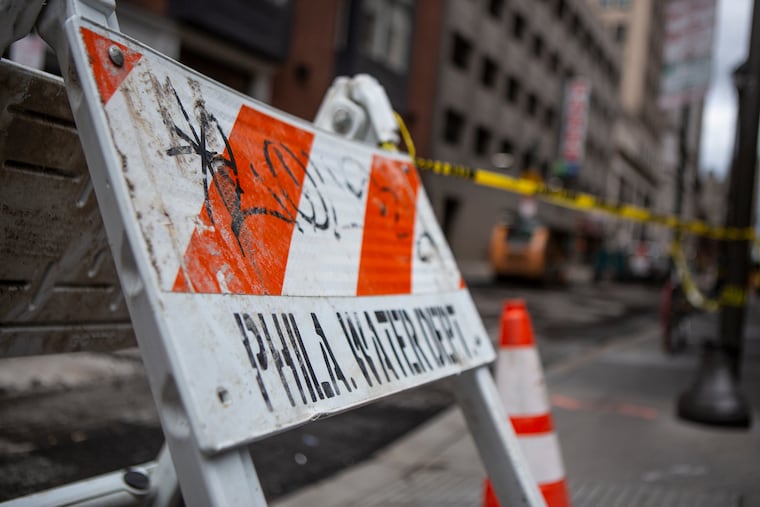The Philadelphia Water Department’s proposed rate hike is bad for consumers | Opinion
Can money from the American Rescue Plan help alleviate the need for rate hikes?

The Philadelphia Water Department (PWD) announced last month it is seeking a 17.6% rate hike. In hearings scheduled this week, it will attempt to explain why it must raise rates 12 times higher than the inflation rate. I attended the March 16 hearings to object, and hope other Philadelphians consider joining the next hearings on March 18 to speak out against this decision, which is set to be finalized by June. Here are a few reasons to oppose the hike.
There is little doubt that some operational costs for PWD have gone up. Undoubtedly, as COVID-19 closed businesses and thousands of workers have lost jobs, the PWD has lost revenue. But the focus of the filed testimony by PWD’s deputy commissioner of finance, Melissa LaBuda, isn’t on keeping costs down or improving collections. Instead, it highlights the department’s focus on making sure the corporations and people who have lent money to the department are not held responsible for the economic effects of the pandemic, such as closures and layoffs.
» READ MORE: Bracing for Philly’s 17.6% water rate increase? Here’s how to be heard in the online public meetings.
Like all utilities, the PWD borrows money to upgrade and replace its infrastructure. The corporations and people who lend it money are issued bonds. The bonds are an agreement to repay the loans plus interest, plus a promise from the PWD that it will collect enough money to pay the bondholders.
As LaBuda’s testimony makes clear: “From both an operational and a credit rating perspective, it is essential for the Department to sustain debt service coverage levels significantly above the minimum levels required by the Rate Covenants to provide rating agencies and bondholders comfort.”
The meaning here reads as shocking as it is straightforward. The PWD recommends raising rates by 17.6% so it can take more money from consumers than is legally required so bondholders can be comfortable. But it doesn’t seem to worry about the comfort of consumers, or meaningfully acknowledge that the comfort recommended for the bondholders comes from the discomfort of a massive rate increase.
The PWD has not yet offered innovative alternatives to cut expenses, like combining meter reading, billing, and collections with the city’s other municipally owned utility, Philadelphia Gas Works. It would also be worth considering buying cooperatives to lower material costs, which has shown success elsewhere, or developing ”in-stream” electrical generation in PWD infrastructure, in line with Portland, Ore.’s approach, to help. What about using PWD’s surplus water as an economic development tool? Perhaps bondholders are uncomfortable with changes, even if they improve the PWD? Or possibly, cutting costs by improving the system wasn’t suggested by PWD’s consultants?
The PWD also hasn’t indicated a plan to examine what part of the billions of dollars set aside in the American Rescue Plan Act to help water utilities could be used to alleviate the need for rate hikes.
Sadly, it’s not just utilities that strive to keep bondholders comfortable. Cities like Houston cover convention center and other hospitality industry bonds, a possibility in Philly where hospitality has taken a huge hit during the pandemic — though the city has also lost tens of millions in wage and other taxes.
None of this is to suggest that bondholders are evil, nor that bondholders shouldn’t want to be paid. It’s to question whether bondholders are part of society, or should they get special treatment over workers and consumers.
Consider: Unlike the workers who have lost their jobs, the small businesses that have been closed, landlords forced to forgo rent collection, mortgage and student loan companies that have been prohibited from demanding payments, and utilities forced to stop terminations, bondholders are still being paid 100% so that they may be comfortable.
» READ MORE: Philadelphia seeks 17.6% water rate increase, citing revenue erosion from pandemic
Would it be that much to ask bondholders to make a sacrifice for the good of the nation? They could agree to accept less now until the threat of COVID has passed. Every penny the bondholders forgo will be repaid in later years. The current year’s savings will help all of us overcome the difficulty that COVID has presented.
Perhaps it’s naive to believe that bondholders will react to our national crisis with humanity. Even so, it is cowardly not to ask. And if the bondholders refuse to help and force a massive rate hike and cuts in city services, at least we will know their commitment to society and response to our suffering. If bondholders are unwilling to help, perhaps we will find a better way to borrow money in the future.
Lance Haver is the consumer reporter for the Hall Monitor Radio Program. Lance@Lance.Haver.com